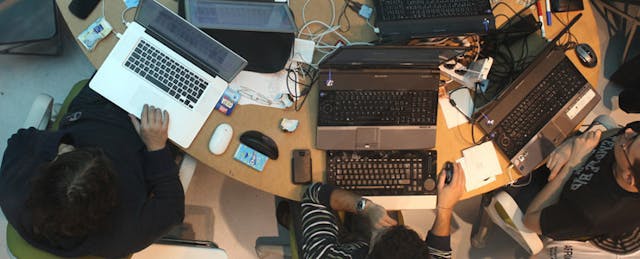TED videos are delightful if you want to watch a memorable performance. Webinars are handy if you're just game to listen and register the occasional comment. But serious MOOCs, or massive open online courses, aim to make you--and a group of collaborators--sweat. And sweat together.
Edstartup 101, which starts today (Wednesday, August 29 at 11:00 a.m. ET), is exactly this breed of MOOC. And as one of its originators, Brigham Young professor David Wiley, sees it, such online community building experience may be just what's needed to spur long-term innovation in education.
"I've been involved for 15 years in grant projects--and each has been successful," Wiley says. "But when the money runs out, all the good efforts stop." One way to create sustained impact, Wiley concluded, is to build companies that can turn promising ideas into ongoing products or services, rather than one-time projects.
As of Tuesday, some 925 people indicated they want to take part in the 18-week long Edstartup 101; more than 120 had completed the course registration, which includes submitting a short video of yourself talking about why you're interested in edtech entrepreneurship. (Here's blogger Audrey Watters' submission.) Says Andrew Staroscik in his introductory video: "I'm motivated by the lights I see go on over my students' heads" when they see some of the interactive illustrations for explaining science that he's created on his site, SciencePrimer.com. He's intrigued with the ideas of taking it further. "SciencePrimer's not much more than hobby at this point," he muses, "but with some additional resources and the right collaborators, it has all the makings of an edtech startup."
That's just the spirit that the quartet of education specialists who started Edstartup 101 hope to see. Three of them hail from Brigham Young University: Todd Manwaring, Aaron Miller and David Wiley. The fourth, Richard Culatta, is currently the deputy director of the office of educational technology at the U.S. Department of Education. (Bios are here.) "There' an anti-entrepreneurial feeling in most of the schools of education," Wiley observes. "I think that mindset is why there's such a slow pace of innovation in education." He hopes Edstartup 101 will encourage faculty and researchers in education schools to apply their ideas by building products--and companies.
The class is built around a graduate seminar that focuses on 10 topics that can help aspiring entrepreneurs move from articulating ideas for education ventures through constructing business models. Some 16 speakers have pledged to participate, including Knewton founder Jose Ferreira, Gates Foundation deputy director Josh Jarrett, and Union Square Ventures investor Fred Wilson. (Full disclosure: I'm online, too, giving an overview of the startup space next week on Sept. 5. Like everyone involved, this is a pro bono performance!)
Sessions are supposed to be short on prepared remarks and long on Q&A, conducted in "Stack Overflow" style, where participants vote up the questions they most want answered.
More important than the speakers, Wiley expects, will be the interactions among the participants. "Relationship building is an important part of the education process," says Wiley.
Wiley knows a thing or two about running online classes. He was one of the first professors to run an online collaborative class: his graduate level "Introduction to Open Education," held in late 2007, was taken by 50 students all over the world. Creating a genuine community spirit, he says, was core to even that first class.
The more recent super-sized MOOCs offered by Udacity and Coursera leave him cold: "Those achieve scale by engineering people out of the loop," say, in part by having computers score homework or tests.
By contrast, "we're trying to engineer how to pull people further in," Wiley asserts. Homework (and there will be plenty) will include writing posts on a blog and making videos. Students are encouraged to comment and critique each others' contributions. As the program grows, so, too, do the number of potential commentators on one another's work.
A dozen graduate students at Brigham Young will earn credit for taking the class. Everyone else takes the class for free but no credit. "You can say that those graduate students are footing the bill," Wiley muses. "But I wouldn't have been able to get all the speakers for a class of a dozen"--and he expects his students will also benefit from the feedback of all the online participants.
The class won't help people find funding--Wiley figures that's grist for EdStartup 201. But success--for the program--does include witnessing the birth of a couple of new education ventures. "We like the 'nail it then scale it' approach," Wiley says. "Let's spend time to find real problems and nail down solutions."
Check out EdStartup 101 here or follow it on Twitter (#edstartup).


